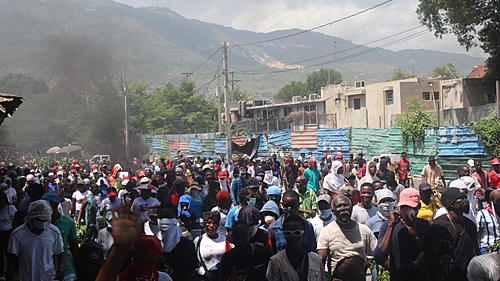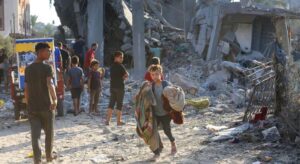
On August 20, a Kenyan assessment mission arrived in the Haitian capital, Port-au-Prince, to analyze the security situation in the Caribbean country. The 10-person group met with senior government officials led by Ariel Henry, the police and diplomatic corps from other countries during the three-day visit that ended Aug. 23.
But both the trip and the plan were strongly condemned by progressive organizations and rights groups that opposed foreign intervention.
The delegation’s visit comes weeks after Kenya offered to lead a multinational police force in Haiti to improve the country’s security and curb gang violence. On July 29, Kenyan Foreign Minister Alfred Mutua posted on X (formerly known as Twitter) that the African country is ready to deploy a troop of 1000 men to train and support the Haitian police in “restoring normalcy”. in the country and protection of strategic facilities.”
The Kenyan proposal came in response to the Henry government’s official request to the United Nations for international military assistance in combating gangs. In October 2022, Henry requested the deployment of foreign troops to help contain the expansion of armed gangs after criminal groups blocked one of the main fuel terminals, located in the capital.
The action caused severe cuts in fuel supplies and high prices for basic items. At the time, several countries supported the prospect of sending a multilateral force to Haiti. However, no country has offered to lead the intervention, despite repeated US efforts.
Following Kenya’s announcement, the US government and UN Secretary General António Guterres, who has been pushing for an international force in Haiti, welcomed the Kenyan government’s desire to be at the forefront of the potential mission. This was despite the Haitian people’s explicit request for an end to all foreign interference in the country and out of respect for their right to self-determination.
US State Department spokesman Matthew Miller told reporters Washington would submit a resolution to the UN Security Council along with Ecuador to authorize the deployment. Canada, Jamaica and the Bahamas have announced that they will support these efforts.
In a note released on August 23, Haiti’s Minister of Communications said that the National Police High Command described the Kenyan delegation’s first visit as “very helpful”. The statement adds that all parties have the same understanding of the mission: “It will not replace the National Police or carry out its work, but will help to make it more efficient, adapted and capable of fulfilling its mission to protect and serve” .
However, Haitian civil society organizations and popular movements were staunchly opposed to the idea of allowing foreign troops into the country, citing the serious problems caused by previous military interventions. They also condemned the international community for supporting Henry, who took over the government after the assassination of then-president Jovenel Moïse and indefinitely postponed the long-awaited presidential and parliamentary elections in 2021, citing gang violence as an explanation.
They also blame Henry and the far-right Haitian Tèt Kale party, which is in power, for the current economic, social, political and institutional crisis in the country.
In an interview with TV barricade, Henry Boisrolin, a member of the Haitian Democratic Committee, pointed out that “a thousand police officers obviously will not solve the issue of insecurity. In other words, the presence of those 1,000 police officers – if they ever make it to Haiti – would be to protect leaders and institutions, not the Haitian people. That is clear”.
Boisrolin also stressed that “the political objective [da missão] is to try to have some kind of apparent calm to organize elections through the creation of a new provisional electoral council… We call this ‘selective elections’, in which they impose someone who will sustain and reproduce the current one [sistema de] power, which is nothing more than a power in function of a neocolonial state”.
Boisrolin condemned the claim that gangs involved in kidnappings, murders, rapes of women and house burnings “have a direct relationship with the government or with the CORE group [formado por embaixadores e outros representantes de países da ONU, OEA, União Europeia, Brasil e outros]”. “Haiti does not produce weapons or ammunition. Everyone knows that these weapons and ammunition come from the United States. How do they get to Haiti? There is an arms embargo in the country, ”she argued.
Regarding a Haitian solution to Haitian problems, Boisrolin highlighted that it is important “first of all, to reinforce the popular struggle in every sense. After that, evaluate whether we can create a liberation front relying on the solidarity – and not the help – of our brothers and sisters in Latin America and the Caribbean. Henceforth, we have full confidence in the resilience of the Haitian people even to confront gangs.”
Boisrolin pointed out that “since April, the movement called ‘Bwa Kale’ has been prominent in the country. People take to the streets with some nationalist police to confront criminals. They have captured and confronted them. Between April and July, the number of kidnappings dropped significantly. So that means Haitians can solve their own problems.”
“We are confident. We know that the path is difficult and not easy, but we believe in the resilience and resistance of the Haitian people and in the creativity of the leaders of popular organizations,” she added.
International organizations reject Kenya plan
Several international human rights organizations, such as Amnesty International, rejected the Kenyan plan to send personnel to Haiti, raising numerous human rights concerns.
Before the Kenyan delegation arrived, the Frantz Fanon Foundation strongly condemned Kenya’s intervention plan in Haiti. The foundation criticized the states that form the Caribbean Community (CARICOM) and some African countries for joining the CORE group and the United Nations in supporting armed action in Haiti.
“This military intervention is an attack on the right of the Haitian people to self-determination and sovereignty. This institutional violence only reproduces the violence exercised by former colonizers, including France, which forced the Haitian State to pay illegitimate and illegal debts as the price for its freedom and independence, but also the United States and international institutions such as the International Monetary Fund ( IMF) and the World Bank. The military intervention project rescues what was applied by former colonizers: to prevent the rise of the first black republic by all possible means”, condemned the Franz Fanon Foundation.
“This intervention, which presents itself as a solution to the problems of Haitian society, will only renew the process that is at the origin of these same problems: the denial of the sovereignty of the people of Haiti over its territory, its economy and institutions. Through an illegitimate and anti-Pan-African intervention by the Kenyan army, imperialist nations are using African states to prolong their policies of racist domination over Haiti… around the world, on the continent and in the diaspora. Today it is Haiti, tomorrow it will be one of the CARICOM countries that agreed to sign this military intervention project. The Frantz Fanon Foundation vehemently denounces this intervention and the instrumentalization of African States to serve the interests of imperialist States”, he adds.
Likewise, on August 24, the Kenyan Socialist Revolutionary League in the International Socialist League also rejected Kenya’s offer to send police officers to Haiti to help local police restore order in the country.
violence in Haiti
After the murder of Jovenel Moïse in July 2021, armed bands have increasingly exercised control over the national territory, forcing hundreds of thousands of people to flee their homes. According to reports from several international organizations, violent gangs now control more than 80% of the capital and more than 50% of the national territory. The increasing violence by these gangs and the incompetence of the authorities has increased the activities of vigilante justice groups.
According to the UN Office of the High Commissioner for Human Rights, more than 2,400 people have been murdered in Haiti so far this year as a result of gang violence. Since April 24, more than 350 people, including 310 suspected gang members and police, have been lynched by local people and self-defense groups.
Editing: Rodrigo Durão Coelho
Source: www.brasildefato.com.br

